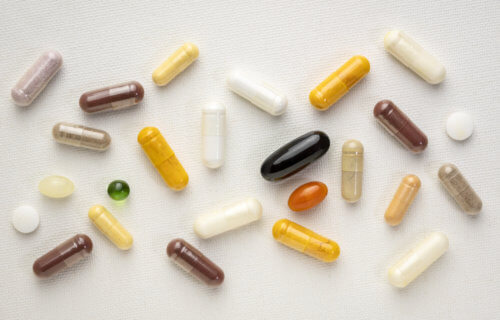by StudyFinds Staff
SOLNA, Sweden — Taking vitamins or dietary supplements could be feeding tumors and promote their growth, scientists warn. Common antioxidants, such as vitamins A, C, selenium, and zinc, can stimulate the growth of blood vessels in cancer when taken in excess. This discovery surprised researchers, as prior studies have shown antioxidants to be protective. While Swedish scientists state that natural levels of antioxidants in food are safe, taking supplements containing additional antioxidants could fuel tumor growth and allow the disease to spread faster.
The study, conducted by a team at the Karolinska Institutet, concludes that vitamin C and other antioxidants promote the formation of new blood vessels within lung cancer tumors. Study authors suggest that this finding could be applicable to all cancers and their spread.
“We’ve found that antioxidants activate a mechanism that causes cancer tumors to form new blood vessels, which is surprising, since it was previously thought that antioxidants have a protective effect,” says study leader Martin Bergö, professor at the Department of Biosciences and Nutrition and vice president of the Karolinska Institutet in Sweden. “The new blood vessels nourish the tumors and can help them grow and spread.”
MY LATEST VIDEOS
Antioxidants neutralize free oxygen radicals, which can damage the body and are commonly found in dietary supplements. However, excessively high doses can be harmful.
“There’s no need to fear antioxidants in normal food but most people don’t need additional amounts of them,” Prof. Bergö adds in a statement. “In fact, it can be harmful for cancer patients and people with an elevated cancer risk.”

The research team found that antioxidants reduce the levels of free oxygen radicals, but when extra amounts are introduced, the drop in free radicals activates a protein called BACH1. This, in turn, induces the formation of new blood vessels, a process known as angiogenesis.
“Many clinical trials have evaluated the efficacy of angiogenesis inhibitors, but the results have not been as successful as anticipated,” says Ting Wang, doctoral student in Professor Bergö’s group at Karolinska Institutet. “Our study opens the door to more effective ways of preventing angiogenesis in tumors; for example, patients whose tumors exhibit high levels of BACH1 might benefit more from anti-angiogenesis therapy than patients with low BACH1 levels.”
Using lung, breast, and kidney tumors, they found that when BACH1 was activated through ingested antioxidants or by overexpression of the BACH1 gene, more new blood vessels were produced. However, these blood vessels were highly sensitive to angiogenesis inhibitors.
“The next step is to examine in detail how levels of oxygen and free radicals can regulate the BACH1 protein, and we will continue to determine the clinical relevance of our results,” Wang concludes. “We’ll also be doing similar studies in other cancer forms such as breast, kidney and skin cancer.”
The study is published in the Journal of Clinical Investigation.
South West News Service writer Jim Leffman contributed to this report.

